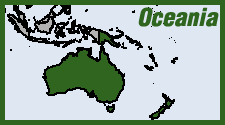 The Northern Mariana Islands, a self-governing commonwealth in association with the United States, just became first US territory to legalize adult-use cannabis. It is also the second US jurisdiction (after Vermont this January) to do so by legislation rather than popular ballot.
The Northern Mariana Islands, a self-governing commonwealth in association with the United States, just became first US territory to legalize adult-use cannabis. It is also the second US jurisdiction (after Vermont this January) to do so by legislation rather than popular ballot.
The Commonwealth of the Northern Mariana Islands, in the North Pacific region of Micronesia, some 3,800 miles due west of Hawaii (see map), is the now headed toward legal cannabis.
The commonwealth's Gov. Ralph Torres on Sept. 21 signed the Sensible Cannabis Act of 2018, which was approved in the territory's Senate a week earlier, and in the House in early August. The bill allows all who are 21 or older to "possess and transport up to one ounce of marijuana, 16 ounces of marijuana products in solid form, 72 ounces of cannabis in liquid form, five grams of extracts, and six immature plants."
The bill also creates a Homegrown Marijuana Registry to regulate private cultivation. For a five-dollar fee, residents of the Northern Marianas will be able to grow six mature and 12 immature plants at any one time. These figures are doubled for medical users, with qualifying conditions listed.
The law additionally contains provisions for commercial cultivation, and cannabis "lounges" for smoking in a social setting. There will be a 10% excise tax on all cannabis grown in the territory.
'Making history' in the Marianas
In a signing statement, Gov. Torres wrote, "Today, our people made history. We took a stand to legalize marijuana in the CNMI for recreational, medical, and commercial use."
But he also cautioned that "it is not legal to use marijuana yet." With his signature on the bill, the commonwealth government has 30 days to set up a Cannabis Commission, with five members appointed to represent the territory's major constituent islands of Saipan, Tinian, Rota and the Northern Islands. These appointments are to be confirmed by the Legislature. Then, the commission will have 180 days to draft and promulgate regulations to enable the legislation. The regulations will take effect 10 days after publication in the Commonwealth Register. So it is likely to be seven months before legalization hits in.
"We will ensure that this industry will be properly regulated and enforced," Torres wrote. "We want to do this the right way."
Torres did use his line-item veto powers to kill provisions of the bill that would have allowed government entities to engage in commercial cultivation and established a maximum $4,500 fee for commercial cultivation or other cannabis businesses. Said Torres, "[S]eeing how lucrative it is in the states, I don't believe that $4,500 for a license is enough." The final fees will be determined in the enabling legislation.
The legalization move seems to be part of a general growing consciousness of herbal culture. Earlier in the week, Torres issued an official proclamation designating Sept. 16 to 22 "Native Medicine Week"—or Simånan Åmut Natibu and Sumwóólal Sáfeyal Falúw in the two indigenous tongues of the Mariana Islands. Torres noted that the commonwealth's constitution recognizes the traditional healers of the indigenous Chamorro and Carolinian peoples. In addition to an annual week of cultural activities promoting traditional medicine, Torries said he would draft legislation designating land on the islands of Saipan, Tinian and Rota for cultivation of medicinal plants.
Legislation named for culture hero
The Northern Marianas, consisting of 15 islands in total, passed through several different colonial hands. The native population was decimated under Spanish rule starting in the 16th century. Spain sold the islands to Germany in 1899, they were then taken over by the Japanese in 1914, and finally came under US control as a United Nations Trust Territory after World War II. In a 1975 plebiscite, the people of the Northern Marianas rejected independence in favor of commonwealth status in association with the US. The entire Marianas Archipelago also includes Guam to the south—a separate "unincorporated territory" of the US, which recently legalized medical marijuana.
Like those of Guam, the people of the Northern Marianas are US citizens by birth, but cannot vote in US national elections and pay no federal taxes. They do elect a non-voting member to the US House of Representatives.
The full name of the legalization law is actually the Taulamwaar Sensible CNMI Cannabis Act, and it is named for David Kapileo Peter—better known by his indigenous name Taulamwaar. A culture hero of the Northern Marianas, Taulamwaar was the musician who wrote the Carolinian version of the commonwealth's anthem upon establishment of its government in 1976 (there is also a Chamorro version). Taulamwaar was a longtime advocate for medical marijuana, who died of cancer in October 2015. As the local Marianas Variety reports, his widow, former CNMI lawmaker Malua Peter, was on hand for the signing of the bill.
Cross-post to Cannabis Now







Recent comments
4 weeks 1 day ago
4 weeks 1 day ago
7 weeks 2 days ago
8 weeks 1 day ago
12 weeks 2 days ago
16 weeks 12 hours ago
20 weeks 18 hours ago
20 weeks 6 days ago
30 weeks 6 days ago
34 weeks 6 days ago